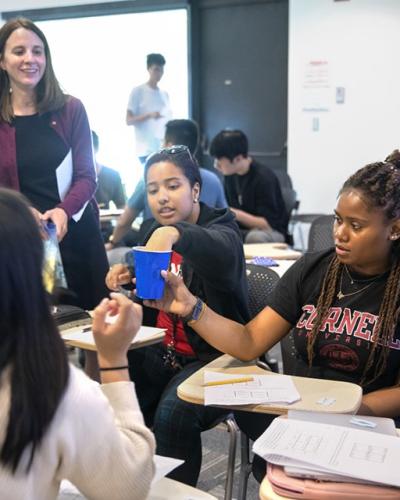Knowing what to study and having the necessary skills to succeed are students’ main course-related concerns early in introductory STEM classes, according to a new study co-led by Cornell researchers – findings that Cornell faculty are now working to address.
The researchers surveyed students at three large Ph.D.-granting institutions to identify broad trends in course-related concerns, with an eye toward improving retention in science, technology, engineering and math majors.
The study, “Undergraduate Student Concerns in Introductory STEM Courses: What They Are, How They Change, and What Influences Them,” was published April 29 in the Journal of STEM Education Research. Co-lead authors are Clara L. Meaders, postdoctoral researcher in the field of ecology and evolutionary biology in the College of Arts and Sciences, and A. Kelly Lane, a postdoc in the School of Biological Sciences at the University of Nebraska, Lincoln.
“Gateway course instructors, even if they are from different disciplines, deal with a lot of the same type of experiences,” said Meaders, who works with co-author Michelle K. Smith, associate professor of ecology and evolutionary biology, in A&S. “If you are teaching courses with more than a couple hundred students, that’s a unique type of experience that cuts across disciplines.”
A large number of students entering college as STEM majors change their plans in their first year. To help retain some of these students in STEM fields, Meaders and Smith are currently leading faculty learning communities (FLCs) – groups of faculty members who meet monthly throughout the academic year. Informed by the study’s findings, these groups are addressing issues and fostering communication to enhance teaching practices in the undergraduate classroom.
“We collected the data needed to create a picture of the student experience in the classroom and shared those data back with faculty, both the broad trends and data specifically from their class,” Smith said. “To address student concerns, faculty in the learning communities are collaborating on ways to change their instructional practices and sharing ideas to make their classrooms more inclusive.”
In the study, the main trend the researchers found in student concern, both during the first week and at the midpoint of the semester, was knowing what to study.
Although levels of concern decreased overall by the middle of the semester, student concern about being able to pay attention and having enough practice problems increased at the halfway point.
In examining these concerns in greater depth, the researchers found that female, first-generation college students in their first semester showed the highest overall levels of concern at the beginning of the semester. The study also found that students with higher levels of concern, at both the beginning and middle of the semester, tended to earn lower grades.
“Working with faculty, we are thinking about how we craft language on the first day of class to help alleviate concerns that students have or create climates where [students] are empowered to ask for help,” Meaders said. “Faculty have heard student questions, and are providing responses to students.”
One of the important benefits of the FLC is having a long-term group, Smith said. “That way,” she said, “participants become comfortable enough with each other to share and see each other as a pool of resources.”
“I think [the faculty learning community] perfectly encapsulates our goal for the project,” Meaders said, “which was to help bridge student experiences with what faculty are doing in the classroom.”
The research presented in this study was supported by funding from a collaborative National Science Foundation grant. The researchers’ Cornell faculty learning community also received support from the Center for Teaching Innovation through an Innovative Teaching & Learning Award.
Dave Winterstein is a communication assistant in the Center for Teaching Innovation.




